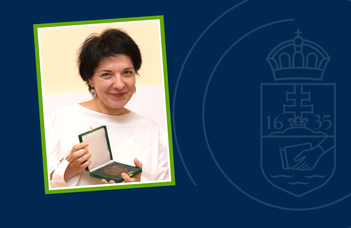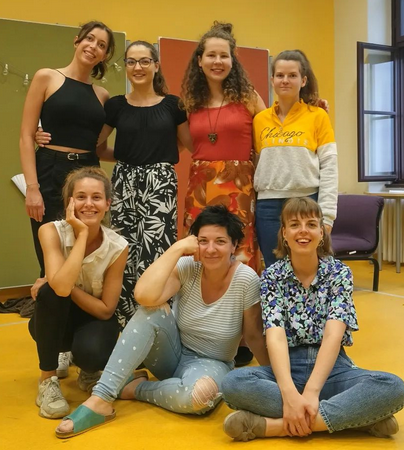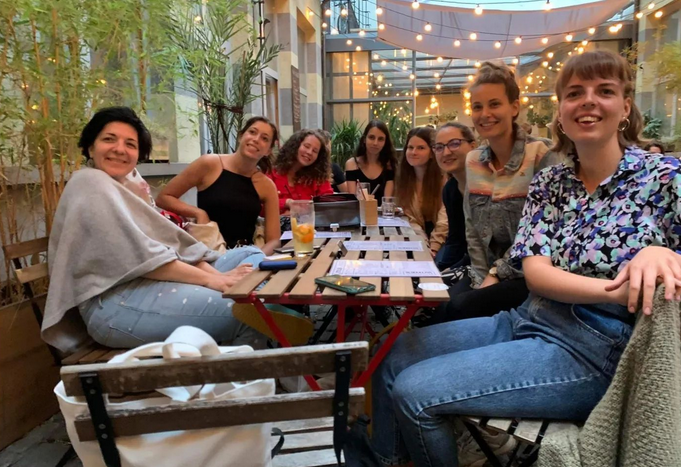"This specialisation is about making you think through theatre."

In 2022, the ELTE PPK awarded you the Pro Facultate award for your high-quality work as a teacher and for your dedicated support of the students in the theater education and theatre pedagogy specialization of the MA in Education. Did you expect it?
I didn't expect it, because it's my natural existence to work 100 percent. However, it was very nice to get an award and also to have a lot of feedback during the training: they see how much energy I put in. But like I said, I couldn't do it any other way.
How did the world of theatre education enter your life?
For me, being a child actress at the Arrabona Student Theatre in Győr was a very defining moment in my childhood. Besides, I was always interested in being a teacher, and when I was accepted to ELTE, at first only for history, Katalin Gabnai and her colleagues taught a 12-unit drama education minor, which could be completed in about two years. I felt that I had found myself when I did that, because
I never wanted to be an actress, but I loved acting,
and I never really wanted to be a teacher, but it was important to be able to do pedagogical activities with children.
The "theatre special", as students call it, was launched as a pilot project in 2020. What aspects were taken into account in the design of the training?
I took over this training from Ádám Cziboly, he accredited it with Aniko Fehérvári and we continued to work together on the course structure after Ádám's departure. I am very grateful to Aniko for the freedom she gave me in designing the courses and choosing my colleagues. This gave me the opportunity to involve many colleagues in teaching the courses and also to keep to myself when I felt I could best teach a subject. This has become one of the strengths of the specialisation: in the different courses, students meet a very diverse range of teachers - people who are very good in the subject area I have invited them to study.
The first was a pilot year in collaboration with the students, so the way the course should look has been shaped in the meantime.
The key element of the training is the structure itself: very focused and practical.
As it is a specialisation, it is important to stress that it does not provide a proper profession, but it does give students a deeper insight into the diverse world of drama. This is supported by the internship, which is a DIE (Drama In Education) performance, where everyone can try their hand at acting, writing, dramaturgy or even directing, and find the role that suits them best. This is what the two-year learning process is really about, exploring what is closest to you in the different roles, what interests you and what you would like to do in the future, after the training.
%20%E2%80%A2%20Instagram-f%C3%A9nyk%C3%A9pek%20%C3%A9s%20-vide%C3%B3k.png)
It was also important for me that during the training the students actively experience that they are able to develop theatre education performances on their own, so that when the two years are over, they dare to experiment, try and join others.
What challenges have you faced over the past two years?
A big difficulty for us was that several semesters of the two-year training were spent with Covid. As this is a fully practical training, it was not always easy to overcome the constraints of the pandemic. The fact that not all of the students in the first theatre pedagogy course were familiar with the stage made things easier. They had to step very seriously out of their comfort zones to become acting people, to take on roles and to act authentically during these two years. But they leapt!
There are many ways to get theatre education. How is this specialisation different? Why would someone who thinks like this choose it?
This specialisation specifically uses theatre to highlight the potential of theatre as a tool. There is no such thing elsewhere. If you go to a drama teacher training course, for example, you will learn about what theatre education or theatre pedagogy is within the framework of drama pedagogy. So you get a small slice of insight within the big set, but here you get the big slice in great detail.

The strength of this training is that it approaches pedagogy through theatre, and does not seek drama and theatre through pedagogy. Through the PPK, people come to this specialisation who are very strong in pedagogical thinking. It's very useful because they know the medium, they know how to think with children, they know pedagogical concepts that don't need to be explained, whereas people coming from the theatre don't necessarily have that. So you can move on much sooner here.
Where can those who graduate in this specialisation find a job?
This training gives the opportunity to think through theatre with children and adults alike. It is a springboard that can lead to many places. You can get a job in a community centre, where you can do community-building, community-building activities. Graduates can go to school to run drama classes. Another way could be to set up an association and thus freely offer different themed activities in schools. In foster care, they can follow a process where pedagogical skills are needed, but they are not expected to have a teaching qualification.
To whom do you recommend the Theatre Education, Theatre Pedagogy specialisation?
For everyone, first of all, and secondly for all those who love to play and who want to develop their personalities and become more confident and courageous adults during their university years.

This article is an edited version of an interview published on the Institute of Education website.

